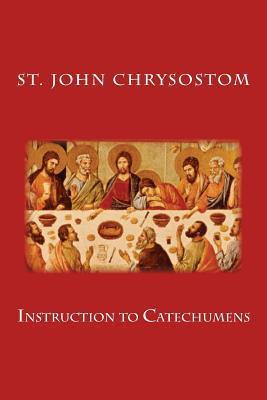Instruction to Catechumens
by John Chrysostom
Apart from his homilies, a number of John's other treatises have had a lasting influence. One such work is John's early treatise Against Those Who Oppose the Monastic Life, written while he was a deacon (sometime before 386), which was directed to parents, pagan as well as Christian, whose sons were contemplating a monastic vocation. Chrysostom wrote that, already in his day, it was customary for Antiochenes to send their sons to be educated by monks. Another important treatise written by John is titled On the Priesthood (written 390/391, it contains in Book 1 an account of his early years and a defence of his flight from ordination by Bishop Meletios of Antioch, and then proceeds in later books to expound on his exalted understanding of the priesthood). Two other notable books by John are Instructions to Catechumens and On the Incomprehensibility of the Divine Nature. In addition, he wrote a series of letters to the deaconess Olympias, of which seventeen are extant.
BUY NOW
Paperback, 30 pages
Published August 16th 2018 by Createspace Independent Publishing Platform
© 2025 Bibleportal.com 版权所有.

John Chrysostom (349 - 407)
Read freely text sermons and articles by the speaker John Chrysostom in text and pdf format Archbishop of Constantinople, was an important Early Church Father. He is known for his preaching and public speaking, his denunciation of abuse of authority by both ecclesiastical and political leaders, the Divine Liturgy of St. John Chrysostom, and his ascetic sensibilities. The epithet Χρυσόστομος (Chrysostomos, anglicized as Chrysostom) means "golden-mouthed" in Greek and given for his celebrated eloquence.The Eastern Orthodox and Byzantine Catholic churches honor him as a saint and count him among the Three Holy Hierarchs, together with Basil the Great and Gregory Nazianzus. He is recognized by the Eastern Orthodox Church and the Catholic Church as a saint and as a Doctor of the Church. Churches of the Western tradition, including the Roman Catholic Church, some Anglican provinces, and some Lutheran churches, commemorate him on 13 September. Some other Lutheran churches and Anglican provinces commemorate him on the traditional Eastern feast day of 27 January. Chrysostom's extant homiletical works are vast, including many hundreds of exegetical homilies on both the New Testament (especially the works of Saint Paul) and the Old Testament (particularly on Genesis). Among his extant exegetical works are sixty-seven homilies on Genesis, fifty-nine on the Psalms, ninety on the Gospel of Matthew, eighty-eight on the Gospel of John, and fifty-five on the Acts of the Apostles.
John Chrysostom, Archbishop of Constantinople, was an important Early Church Father. He is known for his eloquence in preaching and public speaking, and his denunciation of abuse of authority by both ecclesiastical and political leaders.
Chrysostom is known in Christianity chiefly as a preacher, theologian and liturgist, particularly in the Eastern Orthodox Church.
During a time when city clergy were subject to criticism for their high lifestyle, John was determined to reform his clergy in Constantinople. These efforts were met with resistance and limited success. He was an excellent preacher. As a theologian, he has been and continues to be very important in Eastern Christianity, and is generally considered the most prominent doctor of the Greek Church, but has been less important to Western Christianity.
His writings have survived to the present day more so than any of the other Greek Fathers. He rejected the contemporary trend for allegory, instead speaking plainly and applying Bible passages and lessons to everyday life.
... Show more